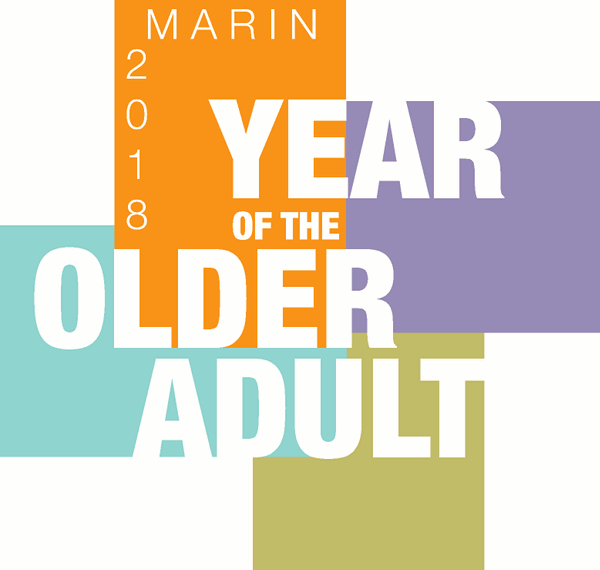From Program Director Linda Jackson:
Our network was in luck this year: the Aging in America Conference, hosted by the American Society on Aging (ASA), came to San Francisco at the end of March. This full immersion into the world of learning about and advocacy for older people across the United States met all expectations. General sessions covered tantalizing topics such as technology reinventing aging, community-based organizations (CBOs) at the forefront for health interventions, ending senior poverty, and innovations in Alzheimer’s.
Marin had a high profile at the conference. The Aging Action Initiative hosted a peer group discussion on successful approaches to advocacy, education, and service coordination within a collaborative network. Shirin Vakharia of the Marin Community Foundation was one of the five co-chairs on the Conference Leadership Committee and moderator for the “Creating and Sustaining CBO Business Partnerships” session at the Managed Care Academy Boot Camp. A.A.I.’s Steering Committee chair Joe O’Hehir was a highlighted speaker at that Boot Camp. The Buck Institute for Research on Aging sponsored a tour of its I.M. Pei-designed Novato campus. And, Erin McAuliffe of Marin Transit and I volunteered for the world cafe discussions at the Second Annual Summit on Livable Communities, which focused on age-friendly planning.
Here’s my top 10 list of things I heard or learned at the ASA conference:
#10 Over 50% of older people are on Facebook! Older people are increasingly using Facebook to connect with each other and with services, and to learn about opportunities to advocate for change.
#9 The program Silver Sneakers allows eligible adults to access thousands of gyms and fitness classes at no cost. Check it out: www.silversneakers.com.
#8 “We’ve added a decade to our lives, but we are likely to need help in that decade, with more and higher health care costs.” Medical facilities are realizing that when people go home with access to community-based supports, there are fewer readmissions, health care costs go down, and employee satisfaction goes up. As more people grow older in Marin in the next two decades, A.A.I. collaborations can play a pivotal role in ensuring that people can age and die at home, rather than in the ICU or an institution.
#7 “Five percent of the older population are ‘complex patients’ accounting for 58 percent of medical costs.” CBOs need to be mindful in health care partnerships about the time and staff needed to provide services to patients with multiple physical and mental illnesses.
#6 Health = 80% social determinants + 20% genes. Many speakers noted how social determinants of health (poverty, race, immigration status, etc.) are coming of age as a common theme nationwide. This leads us to #5 . . .
#5 “Under the new administration, money is going to tech startups and not CBOs. Funding is going to the disruptors who are not as aware or capable as CBOs in partnering for health care.” Arggh! Keynote speakers pointed out that to reduce emergency room visits, readmissions, and the length of hospital stays, health care institutions need to look for “social practitioners.” CBOs already know about the needs of their communities. They know what it means to be poor, hungry, or an immigrant. The greatest potential today to transform medical care is to partner health care institutions with CBOs and the public sector for more responsive and cost-effective health care.
#4 “Health care happens in the home.” No surprise here: most health care is at home, where people are most comfortable. As I checked out the Exhibition Hall, I came across these fun no-maintenance responsive pets: https://joyforall.hasbro.com. There is a wealth of technological innovations making it possible for people to stay at home for as long as possible.
#3 Alzheimer’s researchers are looking for people for clinical trials. We can help spread the word: https://www.nia.nih.gov/alzheimers/clinical-trials
#2 “We are moving from working individually to working collaboratively.” Several speakers celebrated that the recently-adopted budget in Washington included an increase in funding for older Americans, despite an original budget that cut funding. Working together, advocates were able to not just stop cuts to Meals-on-Wheels and others, but to convince elected officials to approve an increase in funding!
#1 “We must stop using language that triggers negatives, creates a fear about aging, and repels potential supporters.” The collaborative Reframing Aging project by eight of the leading aging organizations in the U.S. has the goal to reduce ageism through changing public perceptions about growing older. It provides a wealth of resources for you to use in your organization. Check out this online toolkit. At AAI’s 2018 Convening, we introduced ‘reframing,’ and you will hear more from A.A.I. about this transformative approach this year.
I came back to Marin and our lively 2018 Convening on April 3. Over 100 people came this year! We had a lovely day in Tiburon. In this newsletter, we have A.A.I. Steering Committee member Teri Dowling’s inspired reflection on words from Buddha. In case you missed the Convening, here’s your peek into what we talked about: https://www.ted.com/talks/ashton_applewhite_let_s_end_ageism (Ashton Applewhite TED Talk about ageism). I promise that A.A.I. will share more about this transformative approach in upcoming months.
See you around Marin ~


